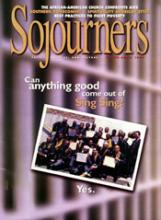Questions of justice, oppression, evil, and forgiveness are eternal ones, and South Africa, through its Truth and Reconciliation Commission, is grappling painfully with them as its people confront the legacy of apartheid.
In his two-hour PBS special Facing the Truth, scheduled to air March 30, Bill Moyers shows us the charred bodies of the "The Cradock Four," men who were murdered for their resistance to the white regime; the infamous "truth" rooms in buildings throughout South Africa where interrogations and killings occurred; and footage from the hearings in which white police officers demonstrate, in exchange for amnesty, the methods they used to torture blacks.
We see many, many mothers crying for their sons, such as Maria Ntuli, whose son Jeremiah was killed in 1986. Along with nine other boys, he was kidnapped and put into a van filled with explosives. This was "preventative" killing, in the eyes of Brigadier Jack Cronje, leader of the death squads that operated around Pretoria. "I thought I was doing the right thing," he said.
Thandi Shezi copes with the assault and beating she received from four white police offers by divorcing her body from her spirit. "I let them devour the body with rape, and my soul and spirit were at the corner, watching," she said. "I told the Truth Commission that I wish to go back, to collect my soul, for the real Thandi is there at the corner."
For some, the Truth and Reconciliation Commission hearings may help start the process of restoring body and soul. Moyers interviews several people who, by the act of telling their stories, have begun to heal. But for others, the hearings merely intensify pain and suffering. Nkosinathi Biko, son of Steve Biko, a prominent activist and leader of the 1970s Black Consciousness Movement, recounts his frustration at the police officers who killed his father but refuse to fully admit it, or accept punishment. "How are we better off now?" he asks Moyers.
Read the Full Article
